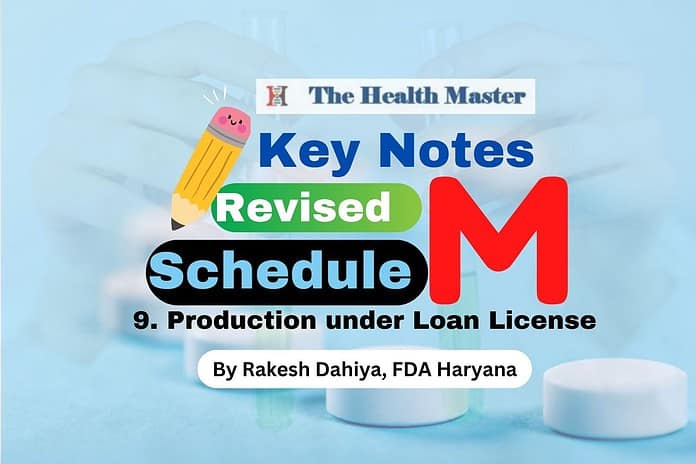- Key Notes on Revised Schedule M: API Part-3 - April 7, 2025
- Key Notes on Revised Schedule M: API Part-2 - March 28, 2025
- Key Notes on Revised Schedule M: API Part-1 - March 15, 2025
Last Updated on March 15, 2025 by The Health Master
Production under Loan License
Key considerations for Point No. 9 – Production under Loan License compliance under revised Schedule M are outlined below.
Continued from: Key Notes on Revised Schedule M: Point No. 8 – Change Control
Production under loan license or contract and contract analysis
Key Principles:
Clear Definition and Control:
- Production under loan license or contract, contract analysis, and other GMP-covered activities must be precisely defined, agreed upon, and controlled to prevent misunderstandings that could compromise product quality.
Adherence to Licensing and Regulatory Requirements:
- All arrangements, including technology transfer and proposed technical changes, must comply with the relevant product license.
- Contracts must allow for audits of manufacturing facilities and activities by the loan licensee or contract giver.
- Final approval for product release in contract analysis must be given by the authorized person in accordance with GMP and the license.
Responsibilities of the Loan Licensee or Contract Giver:
Quality System:
- The loan licensee or contract giver’s quality system must include control and review of outsourced activities.
Assessment of Contract Acceptor:
- The contract giver is responsible for evaluating the legality, suitability, and competence of the contract acceptor to perform the required work or tests.
GMP and Risk Management:
- The contract giver must ensure that the contract acceptor follows GMP principles, including quality risk management.
Information Provision:
- The contract giver must provide the contract acceptor with all necessary information to carry out contracted operations correctly and safely.
Record Review and Assessment:
- The contract giver must review and assess records and results related to outsourced activities.
Product Quality and Compliance:
- The contract giver must ensure that products and materials delivered by the contract acceptor are processed in accordance with GMP and the license, comply with specifications, and are released by the authorized person.
Performance Monitoring and Improvement:
- The contract giver must monitor and review the contract acceptor’s performance, including the implementation of necessary improvements.
Regulatory Compliance:
- The contract giver must ensure that the contract acceptor understands the potential for inspections by competent authorities.
Responsibilities of the Manufacturing Facility Provider or Contract Acceptor:
Adequate Resources and Competence:
- The contract acceptor must have sufficient premises, equipment, knowledge, experience, and competent personnel to carry out the contracted work.
Subcontracting Restrictions:
- The contract acceptor must not subcontract work without prior evaluation and approval from the loan licensee or contract giver.
Quality Assurance:
- The contract acceptor must refrain from any activity that could negatively impact product quality.
Contractual Requirements:
Written Contract:
- A written contract must clearly define the responsibilities of both parties, including outsourced activities, products, communication processes, and technical arrangements.
Authorized Person’s Responsibility:
- The contract must clearly state how the authorized person ensures compliance with the license and GMP in product release.
Technical Expertise:
- Technical aspects of the contract must be developed by competent persons with pharmaceutical knowledge and GMP expertise.
Compliance with Licensing and Agreements:
- All production and analysis arrangements must comply with the license and be agreed upon by both parties.
Responsibility Allocation:
- The contract must specify responsibilities for knowledge management, technology transfer, supply chain, subcontracting, testing, release, sampling, and analysis.
Record Retention:
- Manufacturing, analytical, and distribution records, as well as reference samples, must be retained or accessible to the loan licensee or contract giver.
Product Rejection and Recall:
- The contract must outline procedures for handling rejected starting materials, intermediates, bulk products, and finished products, as well as for product rejection due to contract analysis results.
Compiled by:
Rakesh Dahiya, SDCO cum Licensing Authority, FDA Haryana
Next: Key Notes on Revised Schedule M: Point No. 10 – Self Inspection
Key Notes on Revised Schedule M: Compilation
Important short notes for Industry and Regulators
CDSCO Guidelines on Drug Recall
Quality Assurance Vs Quality Control in the Pharma Industry
Major FDA audit findings about Equipment and Instruments
Understanding GMP, cGMP, and WHO-GMP
Quality Assurance in the Pharmaceutical Industry
Duties and responsibilities of QA person in Pharma Industry
Difference: Disintegration and Dissolution test in pharma industry
Understanding DQ, IQ, PQ, and OQ in the Pharma Industry
Licensing procedure for manufacturing of Drugs
Procedure to obtain license for manufacturing of Cosmetics
Procedure to obtain license for manufacturing of Homoeopathic Medicines
Procedure to obtain license for manufacturing of Medical Devices
Procedure to obtain License to Manufacture drugs for testing and analysis purposes
Procedure to obtain license for Blood Centre (Blood Bank)
Procedure to obtain license for Commercial Testing Laboratories
Procedure to obtain license for Medical Store / Pharmacy
For informative videos by The Health Master, click on the below YouTube icon:
For informative videos on Medical Store / Pharmacy, click on the below YouTube icon:
For informative videos on the news regarding Pharma / Medical Devices / Cosmetics / Homoeopathy etc., click on the below YouTube icon:
For informative videos on consumer awareness, click on the below YouTube icon:









